|
|
|
Sort Order |
|
|
|
Items / Page
|
|
|
|
|
|
|
| Srl | Item |
| 1 |
ID:
116934
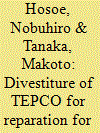

|
|
|
|
|
| Publication |
2012.
|
| Summary/Abstract |
The Fukushima Daiichi Nuclear Power Station held by Tokyo Electric Power Company (TEPCO) had a serious nuclear accident in March 2011. TEPCO's liability for the losses caused by this accident is speculated to reach several trillion yen. For this compensation, TEPCO is supposed to sell its assets, including those for its power business. Their sales are crucial for its solvency. We estimate the fundamental values of TEPCO's thermal plants by modeling their plant operation patterns based on spot market prices and fuel costs. Then, we discuss the implication of their divestiture for TEPCO's reparations in the context of the regulatory reforms as a radical path to unbundling, which has not yet been achieved due to the strong resistance from the incumbents.
|
|
|
|
|
|
|
|
|
|
|
|
|
|
|
|
| 2 |
ID:
092810


|
|
|
|
|
| Publication |
2009.
|
| Summary/Abstract |
Vertical unbundling in the electricity sector is a hot political topic in the European Union. The European Commission has decided that the ownership unbundling of transmission networks from other stages in the value chain is the most effective way to ensure fair network access and infrastructure investment. While this European unbundling debate has not ended yet and most countries still do not have an independent transmission system operator (TSO), the Dutch government has already taken one step further. In 2008, it decided that distribution companies should be completely separated from commercial activities that are part of the same holding (generation, trade and supply). This governmental decision has been fiercely debated. Although the goal is to improve competition as well as security of supply, these benefits are uncertain. Nevertheless, it is certain that ownership unbundling comes at a cost. In this paper we present an ex ante cost-benefit analysis of the Dutch unbundling act. We conclude that it is unlikely that this act is welfare enhancing: divorce comes at a price.
|
|
|
|
|
|
|
|
|
|
|
|
|
|
|
|
| 3 |
ID:
174958
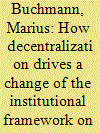

|
|
|
|
|
| Summary/Abstract |
The increasing share of renewables in the electricity system results in congestion on all network levels. To address this congestion, the EU Commission proposed that distribution network operators become responsible for local congestion management. Within this paper we analyze the institutional implications of the introduction of local congestion markets (also referred to as flexibility markets) and identify three discrimination concerns related to the DSO's role on these markets. We will argue that the standard governance models (legal unbundling, ownership unbundling, IDSO) do either not sufficiently address the identified discrimination concerns, or come with additional challenges which make their application less feasible. Instead, we discuss two novel approaches: The introduction of Independent Distribution Operators (IDO) or alternatively, a Common Flexibility Platform (CFP). While the IDO results in a change of the regulatory regime in Europe, the CFP could be applied given the current European unbundling rules. Since the CFP does not require stronger unbundling of DSOs, we recommend to investigate this solution further.
|
|
|
|
|
|
|
|
|
|
|
|
|
|
|
|
| 4 |
ID:
188445


|
|
|
|
|
| Summary/Abstract |
Since the 1990s, East Asia—including Northeast and Southeast Asia—has led the world in adopting a task-by-task international division of labour or international production networks (IPNs), the core of which consists of machinery industries. In this regard, how far has India integrated with East Asia? Using international trade data for comparison from multiple perspectives, this article gives an overview of the current position of India with respect to machinery IPNs and information and communication technology (ICT) services. The article shows that India has not yet participated in machinery IPNs in the East Asian region. We argue that ICT services are a source of strength for the Indian economy, and its competitiveness could be utilized effectively by combining new technologies with traditional industries such as manufacturing. India still has huge untapped opportunities for utilizing the mechanics of a new international division of labour to accelerate economic growth, innovation and poverty alleviation. And economic integration with East Asia could work as a trigger to redirect India’s industrialization strategies.
|
|
|
|
|
|
|
|
|
|
|
|
|
|
|
|
| 5 |
ID:
181438
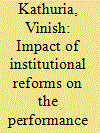

|
|
|
|
|
| Summary/Abstract |
The Indian power sector has seen significant institutional changes in the last two decades. After more than 20 years of reforms, the distribution segment is still incurring losses. To quantify these institutional changes, we construct a reform index and then employ data of 55 power utilities from 29 Indian states for 2007–08 to 2015–16 to see the impact of this index on their financial and technical-cum-commercial performance. This paper contributes to the literature in three ways: a) accounting for the maturity of the reforms while calculating the index, b) relying on the dynamic nature of the reforms, and c) carrying out the analysis at the utility level. We find that once the dynamic nature of the data is accounted for and utility-specific variables are controlled, the reform index influences both the financial and the technical-cum-commercial performance of the utilities. An important policy implication of the present study is that as long as the cost-reflective tariff is still prevalent, the commercial viability of utilities cannot be assured
|
|
|
|
|
|
|
|
|
|
|
|
|
|
|
|
| 6 |
ID:
166707
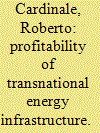

|
|
|
|
|
| Summary/Abstract |
This paper explores how the profitability of European transnational gas infrastructure is affected by (i) alternative ways to organize the gas supply chain; and (ii) different forms of energy diplomacy. In particular, through a case study, the paper analyses how these factors determined the realisation and success of the Greenstream pipeline and the stalemate of the Galsi pipeline, despite the potential for both projects to be profitable. The issue is important in view of the full transition to the EU Single Market, of which unbundling and privatisation are policy pillars. In fact, before the transition, vertical integration in the foreign upstream and energy diplomacy were key elements for infrastructure profitability. The paper argues that these elements are still important, as constraints to gas procurement and binding contractual relations with producers have not changed substantially. Nevertheless, securing those advantages within the EU Single Market framework requires significant innovations. In particular, the paper suggests forms of EU energy diplomacy, based on bilateral trade deals, which could achieve forms of vertical integration for energy firms as well as help EU and non-EU counterparts align their interests. This paper may prove particularly relevant for the recent debate on how to shape EU energy diplomacy.
|
|
|
|
|
|
|
|
|
|
|
|
|
|
|
|
| 7 |
ID:
158548
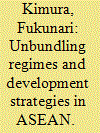

|
|
|
|
|
| Summary/Abstract |
This paper extends the conceptual framework of “unbundling” proposed by Baldwin (2016), and tries to provide a starting point for reorganizing development strategies of ASEAN member states (AMS). While AMS have largely been successful in utilizing the mechanics of the second unbundling with a reduction in communication costs, there still exists a lot of room for exploiting its benefits. In addition, a new wave of the third unbundling, which comes with a reduction in face-to-face costs, has already arrived at ASEAN, and AMS must start incorporating it into their development strategies.
|
|
|
|
|
|
|
|
|
|
|
|
|
|
|
|
|
|
|
|
|